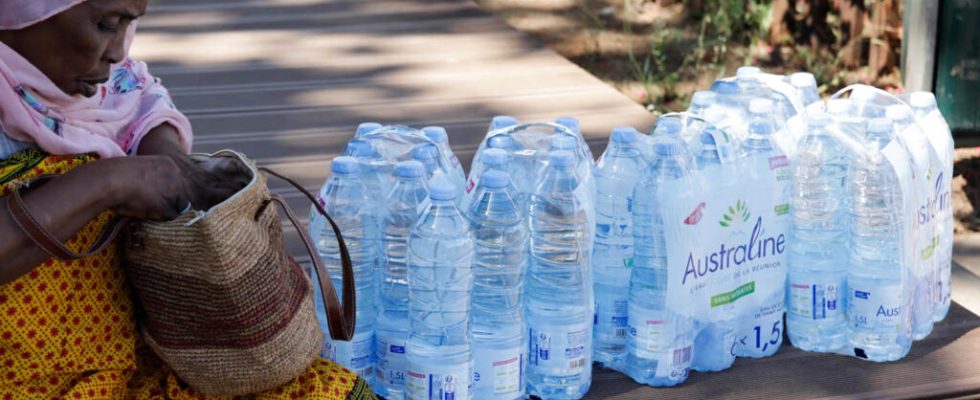Our selection – “ Mayotte is thirsty “. It is with this slogan that the Mahorais are saying, this Wednesday morning, September 27, that they are fed up. The Overseas Minister, Philippe Vigier, is expected in the archipelago for the second time in a month. Mayotte is the 101st French department and also the poorest in France. Already marked by insecurity, it is also experiencing a serious water crisis which is hitting the health system and schools hard.
5 mins
There has been no rain in Mayotte for months and the archipelago’s reservoirs are drying up. Since the beginning of September, the authorities have tightened measures water restriction : the population is deprived of running water two days out of three. And this disrupts all daily life. Faoulati Sandi, resident of the island, recounts the struggle to store water between the cuts : large plastic basins in the shower, buckets next to the toilet, making sure that children do not drink tap water…
The Regional Health Agency (ARS) has in fact given instructions to boil water which comes out of the conduits after the cuts. “ Some days she’s muddy », reports Faoulati Sandi. “ When the water comes back, I have to be careful. Sometimes we don’t even use it for showering because it’s dirty, it’s not drinkable. »
Consequence: in stores, the price of packs of bottled water is soaring, despite the price freeze decided by the prefecture.
No water, no lessons
There water crisis also affects the lives of schoolchildren. A school without tap water means dozens of children going to the toilet without being able to flush and without being able to wash their hands. This is not sustainable. Last week, several middle and high schools closed their doors due to water recognized as unfit for consumption by the ARS. The academy rector, Jacques Mikulovic, assures that these establishments have since reopened.
Of the 188 schools on the island, no less than 80 are experiencing cuts. They have received tanks to store water, but some tanks are not yet connected. And others were vandalized to steal water, the rectorate said.
“ The problem is that our tanks were sized for 24 hours of water cutoff, and there we arrived at 48 hours of cutoff », explains Jacques Mikulovic, the academy rector. “ We therefore decided to welcome the children only in the morning during breaks, rather than one day of class and one day without anything. And the idea in the afternoon is that we can try to compensate, at least poorly, for a certain amount of teaching content for primary schools via local television. » But not all students have parents capable of helping them do school work at home, worries Ousseni Zaidou, from FSU-SNUipp, a primary school teachers’ union. Covid has shown it: distance learning is an accelerator of inequalities.
In the commune of Koungou, Faoulati Sandi completely changed her son’s school. “ I took him out of there because he only had school two half days a week. This is unacceptable ! The basics of teaching are in CP », she protests. And the mother recalls that in certain schools in Mayotte, there are already “ rotations “. “ As the classes are overcrowded, teachers are obliged to teach part of the students in the morning and the other part in the afternoon. And now there is the added water crisis. »
The Mahorean education system is already suffering in normal times, confirms trade unionist Ousseni Zaidou of FSU-SNUipp. “ Six to ten thousand children are not in school because of the lack of buildings. In the classrooms there are sometimes up to 30 or 35 students. », he reports. “ And the educational level is very low », confirms the rector of the academy. “ We should not be surprised if, after this water crisis, the results are even worse », Warns Ousseni Zaidou.
Also listenGUEST FRANCE – The water crisis in Mayotte arrives after “many years of inertia”
Cuts even at the hospital
Health, already hard hit by the glaring lack of staff and insecurity, is another public service impacted by the water shortage. “ At the hospital we were told we wouldn’t have any cuts, but we did. », testifies this practitioner from the Mayotte Hospital Center (CHM), who preferred to remain anonymous. “ We had an episode of muddy water in several services. For our instruments which require water in the circuits, we cannot ensure the quality of the water. Some services also reported that the water pressure was too low, which poses a problem for the sterilization of the equipment. », she lists. “ What really worries us is that we are only at the beginning of this crisis, we do not know how it will evolve. »
The National Public Health Agency in Mayotte is also worried. “ The archipelago experiences an epidemic of gastroenteritis every year between June and September », Explains Youssouf Hassani, head of Public Health France in Mayotte. For several weeks, the organization has detected an increase in sales of antidiarrheals and oral rehydration solutions. “ We also saw that the peak of gastroenteritis was slightly above what we have experienced over the last three years. “, he specifies, before wondering: “ Was that the peak and now it’s going to drop? Will there be another increase? We are closely monitoring the situation. »
In the field, caregivers also confirm numerous cases of patients suffering from gastric problems. “ In twelve years of working here, I have rarely seen this », Estimates a home nurse in the south of the island.
The National Public Health Agency in Mayotte also monitors water-borne diseases. “ There is a risk that typhoid or hepatitis A, endemic in Mayotte, will flare up, or even that cholera will reappear. », explains Youssouf Hassani.
Also listenMORNING GUEST – Philippe Vigier: “I want to get Mayotte out of the impasse in which it has been for too long”
